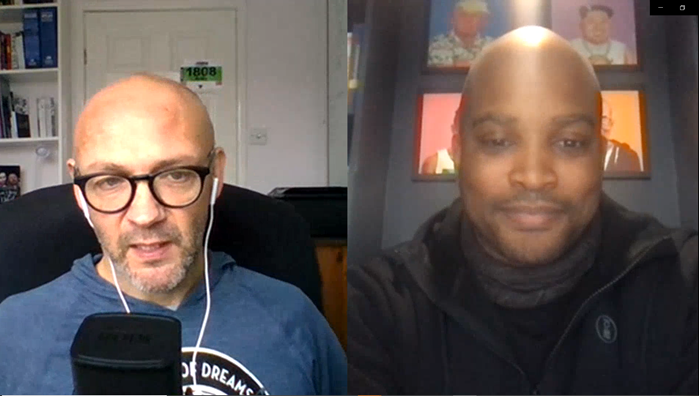Talking entrepreneurship with mentor, Justin Gilchrist
15 February 2022
Justin Gilchrist is the cofounder of WellBox, a platform that makes sending gifts for businesses easy. He's also the author of Digitally Wed, the entrepreneur's guide to buying profitable established web-based businesses, and a Growth Hub mentor. Here he talks to the Hub’s Mentor Relationship Lead, Andy Hall about dealing with the pandemic, mental health and why too much planning can stifle the best of ideas.
Hi Justin, could you tell us about you and your journey into entrepreneurship?
Business and entrepreneurship are my work, my hobby and my passion. I started off in graphic design and then moved into web design, and since then I’ve been fascinated by tech and what it can do. I’ve set and up and sold several companies involved in tech, as well as food and drink.
I’ve been called a T-shaped entrepreneur, which basically means I know a bit about a lot and have a deep knowledge of one particular area. When you’re an entrepreneur that’s an advantage, it means you can get into the details of something if you choose but then you can get out and look at it strategically from a 30–40-thousand-foot view at the same time.
How did the pandemic impact you?
The pandemic was a make-or-break situation for many businesses, in that it either catapulted you into a different model, or accelerated your business growth, or it had a very opposite effect. Unfortunately, with our corporate hospitality business, it was a case of the latter as demand dropped off with office closures and events being cancelled.
But then WellBox came along. It’s a way of making it easier for people to buy and send gifts within a business - often as a thank you for a job well done. We’re dealing with lots of FTSE250 companies now and it really only came about because of the pandemic.
From a business perspective, a lot of people have managed to turn the pandemic into an opportunity; that’s the mark of a true entrepreneur in some regards - people who can take whatever they have at the time and find a way to make good out of it.

Justin Gilchrist, Entrepreneur, Mentor, Author
What challenges have you faced as an entrepreneur?
Mental health is something that can sometimes be ignored.
For me it’s always been that question – am I doing enough? And I think when you have children it’s even worse because then you start to think whether you’re spending enough time with them, too. This has also been a big tussle and something I’ve struggled with.
From a business perspective, externally, there is very little support for that middle stage business. So at WellBox we passed the ‘small business’ stage very quickly but we’re not at the size yet where we have the infrastructure or the access to the experience we need. So we have to solve these problems ourselves.
In this sense one thing to consider is culture. As you grow, your initial core team of 20 or 30 people will effectively dictate the culture for the rest of the organisation and the challenge is getting that right. But it’s not as easy as reading an article on the web, it requires a lot of thought and planning.
You need to get that balance between work and homelife.

(Left) Andy Hall, Mentor Relationship Lead, GC Business Growth Hub, (Right) Justin Gilchrist, Entrepreneur, Mentor, Author
What are some common challenges that you have seen other entrepreneurs face?
One of the things I see is people planning too much or delaying execution because they are waiting for the perfect scenario, and that’s dangerous.
It’s easy to over complicate things. Quite often this is about securing the finance and funding to develop a product and idea before rolling it out; but raising capital can take a long time especially if you’re unproven, or you don’t have any assets to secure debt against.
You need to establish what’s called a minimum viable product (MVP) which is a version of a product with just enough features to be usable by early customers, who can then provide feedback. You need this feedback because working in a vacuum can kill an idea.
Bring something to market quickly - if you keep waiting, then that’s when the doubts can start to creep in. And if it’s not going to work, you’re going to find out sooner rather than later that way, too.
What would your advice be to businesses or entrepreneurs just starting out, and what support is available to them?
Their first port of call should be to the Growth Hub. It’s a superb source of free advice - you can’t fault it. The advisors are skilled, experienced people and if they can’t help you, they will know someone who can.
I also swear by accelerators not only because of the coaching and mentoring they offer but because of the community. As entrepreneurs, we are all guilty of spending a little bit too much time inside our own heads but just having other people who you know will give you feedback or advice without judgement is really important.
So, finding that peer network, that community of entrepreneurs, is important not just from a strategic business point of view but from a mental health and wellbeing point, too. Being the founder of a business can be lonely, so it really helps to feel there’s someone else on the journey with you.
Any final thoughts?
The freedom of working for yourself and being an entrepreneur is something that’s so intoxicating. Of course, you have low points but actually when the high points hit they are so good that they cancel out everything that you’ve been through and it genuinely is lifechanging.
And never be afraid to try something, even if you aren’t an expert. I’ve seen a lot of scrappy start-ups, the ones that tend to do best are the people that just refuse to be told ‘no’.